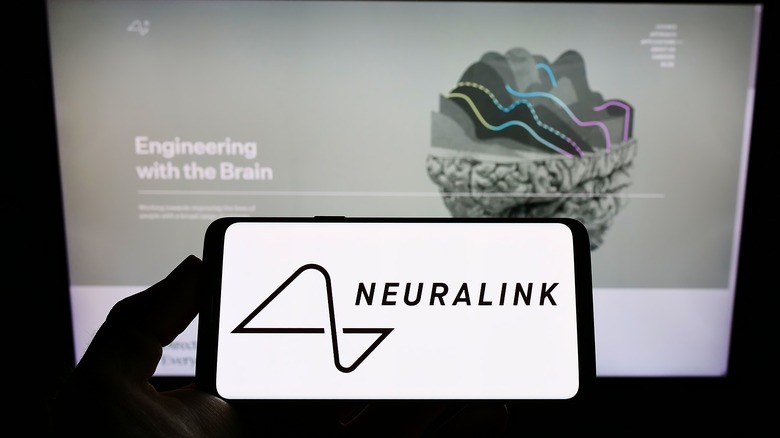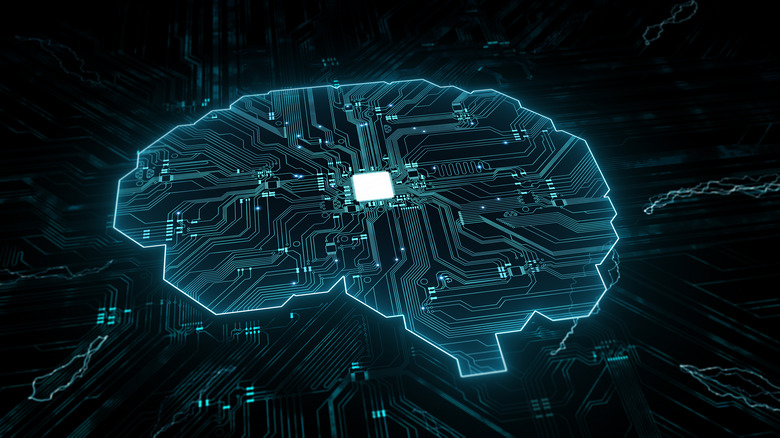

Neuralink Faces Another Probe, This Time Over Transporting Monkey Brain Implants
source link: https://www.slashgear.com/1195072/neuralink-faces-another-probe-this-time-over-transporting-monkey-brain-implants/
Go to the source link to view the article. You can view the picture content, updated content and better typesetting reading experience. If the link is broken, please click the button below to view the snapshot at that time.

Neuralink Faces Another Probe, This Time Over Transporting Monkey Brain Implants

Neuralink didn't manage to reach its goal of starting human trials in 2020, and that has reportedly been a big issue for owner Elon Musk. The neurotechnology company is developing what it describes as "brain-machine interfaces" that, in the utopian view of things, could lead to implants that help restore mobility in paralyzed individuals and treat other types of neurological damage caused by diseases. That's a noble cause, but the effort to reach that point has reportedly come at the expense of animal safety, leading to allegations of cruelty and needless deaths.
In early December 2022, Reuters alleged that Neuralink was facing an investigation by the USDA over claims that it had rushed experiments in an effort to meet Musk's demanding timeline, allegedly leading to the unnecessary suffering and deaths of animals. The allegations — which were based on documentation Reuters had viewed, as well as claims from insiders — were expansive, including everything from surgeries that reportedly had to be repeated due to avoidable mistakes all the way to staff who were said to have been unprepared to conduct the surgeries. Insiders claimed that some employees had left the company over concerns about how the animals were treated, and that others raised concerns internally, but that ultimately the workers faced a "pressure cooker environment."
Only two months later, a new report from Reuters reveals that Neuralink faces another investigation, this time by the U.S. Department of Transportation over allegations that it had improperly transported implants removed from monkeys' brains — implants that may, in some cases, have harbored risky pathogens like antibiotic-resistant staph.
Neuralink accused of improperly handling implants removed from sick monkeys

The latest investigation is the result of another complaint about Neuralink penned by the Physicians Committee of Response Medicine (PCRM), which alleges in a letter that it has obtained public records that reveal the potentially unsafe handling of these removed implants. PCRM claims that "individuals working for Neuralink appear to have unsafely packaged and transported materials ... carrying infectious pathogens on several occasions." The committee reveals that the sources of its information are documents provided by the University of California, Davis, under the state's public records act. The university worked as a partner with Neuralink from 2017 to late 2020.
At the time of penning its letter, PCRM claims to have obtained 327 pages of "communications between Neuralink and UC Davis." Emails included in these documents allegedly reveal concerns among university employees about the handling and transportation of removed implants. Quoted emails shared in PCRM's letter describe multiple instances of removed implants allegedly being transported improperly between Neuralink and UC Davis, including ones that were reportedly removed from monkeys suffering from serious infections. As well, the letter claims that "on at least one occasion, Neuralink employees transported explanted hardware carrying potentially infectious substances from the company's facility to UC Davis 'in an open box with no secondary container.'"
The U.S. Department of Transportation confirmed in a statement to Reuters that it is investigating the matter to determine whether Neuralink has violated laws related to the handling and transportation of these hazardous materials. The news comes only a few months after Elon Musk claimed (again) that human trials at Neuralink may be right around the corner.
The Incredible And Controversial Evolution Of Elon Musk's Neuralink

Elon Musk is no stranger to controversial and outlandish ideas. Over the past few years, he's suggested nuking Mars to make it more habitable, mass-produced a "flamethrower" that was promptly banned in several states, and promised to have a prototype of a 5'8" tall robot butler ready sometime in 2022.
The long list of Musk's strange projects also includes Neuralink. A brain implant that promises to help people overcome disability, interface with electrical devices, increase their cognitive ability, and even upload their memories to the cloud. It may sound ambitious, but Neuralink's testing has come a long way. The scientists developing the device, and Musk himself, believe it is ready for human trials and hope the FDA will give them the green light soon. However, testing may not have gone as smoothly as first reported, several legal and ethical hurdles still stand in the way, and some competition has emerged. So let's take an in-depth look at what Neuralink is, what it promises to do, and what has happened so far.
What is Neuralink?
Neuralink is a brain implant that translates the electrical fields our brains produce into code which can then be used to interact with numerous electrical devices. The company's website states that the device will let you control a computer or mobile device anywhere you go. The implant consists of a chip and some tiny threads that link up with various parts of the brain. There is also a charger that wirelessly connects to allow users to charge their Neuralink implant from the outside. An app would be used to teach people how to interface with the device and connect them to other objects via Bluetooth.
Musk and Neuralink hope that the installation procedure for their chip will eventually be quick and painless. He has claimed the procedure may subsequently be performed in doctors' offices and take less than an hour. The company has designed a robot to "reliably and efficiently" insert the chip's threads into the areas of the brain where they need to be. However, Neuralink has stated that the first testers will undergo the typical brain surgery process and have holes drilled through their skulls.
Musk wants Neuralink to help people with brain injuries in the short term
One of Neuralink's main goals is to help people with brain, and spinal injuries overcome their disabilities. Elon Musk has claimed that paralyzed person with a Neuralink implant could operate a smartphone with their mind faster than a non-disabled person could operate one with their thumbs. Musk says that Neuralink could be used to treat a variety of medical issues that impact almost everyone at some point in their life. The conditions listed during his presentation ranged in severity. So far, it has been claimed that Neuralink may help treat: memory loss, depression, anxiety, hearing loss, insomnia, addiction, blindness, extreme pain, strokes, paralysis, seizures, and brain damage.
Neuralink expects the device's first application to be "computer control for people with quadriplegia." Speaking to the Wall Street Journal, Musk said he hoped the device would be tested in people with "severe spinal cord injuries" following FDA approval. He went on to once again claim the technology could restore "full-body functionality" to people with spinal cord injuries.
The possibilities could be life-changing for everyone
If Musk and Neuralink's claims are true, Neuralink will have the potential to enhance the lives of the able-bodied as well. Since the early days of Musk's involvement, there have been suggestions that Neuralink could be used to increase a user's cognitive ability. So if you're bad at mathematics, for example, you could have a calculator automatically feeding answers into your brain the second you think of a problem.
Black Mirror's creators pictured their show as more of a warning than an inspiration. Unfortunately, part of Musk's vision eerily parallels "The Entire History of You." Musk says you will be able to upload memories via your Neuralink and replay them at your leisure. Musk also claims he wants to save everyone time by cutting out steps like speaking or writing when performing tasks or conveying ideas (via The Guardian). Although its initial focus is on the medical field, Neuralink has openly stated that its goal is to one day produce "BCIs that are sufficiently safe and powerful that the general population would want to have them."
It can have less life-changing applications in the long-term too
If Neuralink lives up to its promise, most of its applications may not be life-changing at all. Interfacing with electrical objects will just be simplified. Instead of looking for the TV remote, you could just change the channel with your mind. Rather than ask your home assistant, your house's lights could be controlled telepathically. No Xbox controller? No problem, you might be playing games with your mind one day.
As we've mentioned, Neuralink is initially focusing on larger, life-changing problems. But if it hits a point where anyone can opt for an implant, it could lead to people interacting with all of their electronics through Neuralink. As we mentioned earlier, Musk and Neuralink's initial plans involve linking someone to their phone or computer. From there, the user's phone or computer can be used to connect to other items like keyboards, cameras, and writing programs. If you already have the option to control something with your phone, Neuralink suggests you could control it with their implant too.
Musk has also speculated that a Neuralink could be used to stream music directly into someone's brain. He has also described the device as a "Fitbit with tiny wires" and suggested health monitoring will also be part of the package.
It could help people compete with AI, or maybe even interface with it
Elon Musk has a strange relationship with artificial intelligence (AI). AI development is central to a number of his companies, including Tesla, which relies on advanced AI for its promised self-driving features. Musk has also repeatedly claimed AI will one day destroy the human race and even lobbied the UN for limitations on its use in warfare.
Neruralink's relationship with artificial intelligence is similar. On the one hand, Musk claims the cognitive and speed boosts Neuralink will give people the ability to compete with advanced AI in the future. On the other, Musk has also said it will allow people to interface with AI, "merging their brains" with advanced computer systems. However, Musk's consistent wariness of AI seems to play a part in the merger, too — he sees it as the only way people can stay competitive as artificial intelligence advances.
There are legal and ethical hurdles, obviously
As brain surgery is central to Neuralink's concept, there are obviously a number of legal and ethical considerations to be made. North Carolina State University has published a number of papers on brain-computer interface (BCI) technology. In those papers, several experts highlight the risks involved with this new technology. Some of the risks include those commonly associated with surgery, infection, and glial scarring. Veljko Dubljević, who co-authored two of the papers, also highlighted the difficulty in upgrading the devices as technology improved. While you can simply trade in your old cell phone as a new one is released, things get more complex when the thing you're trying to trade in has been embedded in your skull.
The US Food and Drug Administration (FDA) has also published extensive guidelines relating to the development of BCI technology. Everything from the way data is reported to the use of adolescent patients has been discussed and regulated, and a lot of the guidelines overlap with the regulation of other devices. FDA approval is one of the major hurdles Neuralink is trying to overcome, and it has still not been granted, despite both Musk and Neuralink insisting their work exceeds the standards the US government has laid out.
Neuralink has already performed several successful animal tests
The first hint of successful animal testing emerged in 2020 when pictures of a rat with a chip protruding from its head were included in one of Neuralink's research papers. The device implanted into the rat measured 23 x 18.5 x 2 mm and contained over 3,000 electrodes that were connected to the rodent's brain through 96 threads. A USB-C port was used for "full-bandwidth data streaming from the device."
Neuralink has moved beyond rats. The device has also been successfully tested in both pigs and monkeys. The company's Youtube channel shows the brain activity of one pig, Gertrude, as she is being fed in her pen. Unlike the rat, the implant itself does not seem to be visible on the much larger pig — which suggests Neuralink would also be invisible when implanted into a human. The most standout example was the devices used in a macaque. A video released in early 2021 shows the monkey playing the classic videogame "Pong" and controlling the paddle with nothing but its brain waves.
Animal rights conflicts
Some of the monkeys Neuralink was tested on weren't so lucky. Animal rights group the Physicians Committee for Responsible Medicine (PCRM) claims it has obtained records showing 15 of the 23 monkeys Neuralink was tested on died during the company's tests. Beyond that, the PCRM claims the monkeys were subject to extreme suffering during the trials. Among the committee's claims are allegations that Neuralink and UC Davis staff did not provide dying monkeys with "adequate care," used an unapproved "bio glue" that destroyed the brains of two monkeys, and euthanized some monkeys before they were even used in the experiment.
In response, Neuralink admitted eight monkeys died over the course of its experiments and that two of those were euthanized "at planned end dates" to gather information that could only be obtained through autopsy. The company's website currently contains an animal welfare statement that claims the company used external institutions to house the animals while their own facility was being built and that some "terminal procedures" where the animal is killed at the end of the experiment were performed. Neuralink also claimed some macaques were missing fingers due to conflicts with other monkeys, but none of these conflicts had occurred under their care. All animal testing performed by the company had met the necessary federal requirements.
Neuralink then describes its current facilities and practices with regard to animal testing, including the 6,000-square-foot vivarium built to house the animals and the specially trained staff it has on hand.
Musk wants to put Neuralink in a human this year
During a 2021 interview with the Wall Street Journal, Musk outlined his desire to put a Neuralink chip in a person at some point in 2022. During the interview, Musk described the device as "safe," "reliable," and "something that can be removed safely." Musk again confirmed the first patients the device would be tested on would be people who suffer from serious, debilitating spinal cord injuries such as quadriplegics and tetraplegics (people who have lost the ability to voluntarily control the movement of multiple limbs). The world's richest man went on to say he is "cautiously optimistic" about Neuralink's chances of success.
Although Neuralink is still waiting for FDA approval, some of the company's direct rivals have been given the green light to proceed with human testing. New York-based Synchron Inc., which has been around since 2012, got the go-ahead in 2021 and announced the enrollment of their first patient in early May 2022 (via Businesswire). Like Neuralink, Synchron is developing a product that will allow the human brain to interface with existing electronic devices. Synchron also intends to use its device to improve the lives of people with debilitating medical conditions. So Neuralink may one day change the world, but there's a good chance another company will get there first.
Recommend
-
 11
11
Feb 5 / by Dan RobitzskiNeuralink May Start Human Implants Later This Year, Elon Musk SaysWould you volunteer for a first-gen Neuralink implant?
-
 6
6
TechElon Musk’s Neuralink explains how a monkey used its brain-computer tech to play PongPublished Fri, Apr 9 20218:40 AM EDTUpdated Fri, Apr 9 2021...
-
 10
10
Probe — Neuralink faces federal probe over alleged animal abuse, “hack job” surgeries Current and former employees blame mishaps and abuse on pressure from Musk to go faste...
-
 8
8
Neuralink probed for allegedly transporting contaminated devices removed from monkey brains / Musk’s brain implant company faces new allegations that it failed to handle its devices safely after removing them from mon...
-
 10
10
gross — Neuralink transported brain implants covered in pathogens, group alleges This is the second federal probe for Musk's brain-computer interface company....
-
 2
2
Elon Musk's Neuralink accused of unsafely transporting infected material Would you get a brain chip implant from this man? By
-
 4
4
The FDA gives Elon Musk's Neuralink permission to put brain implants in humans After initially rejecting the application By
-
 10
10
Musk's Neuralink says cleared for human test of brain implants by Glenn CHAPMAN...
-
 6
6
Elon Musk's Neuralink Raises $280 Million...
-
 6
6
British bid to create brain implants to rival Elon Musk’s Neuralink Taxpayer-backed group calls for ‘b...
About Joyk
Aggregate valuable and interesting links.
Joyk means Joy of geeK